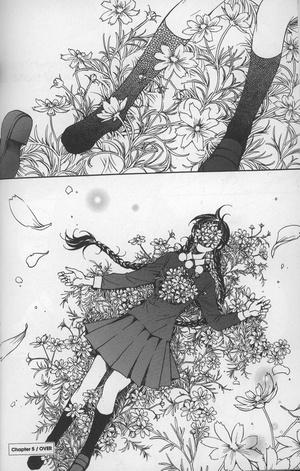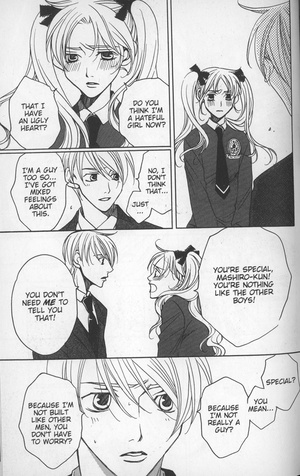Jason Thompson's House of 1000 Manga - After School Nightmare
by Jason Thompson,
Episode LXIV: After School Nightmare
"A lot's happened, and now my head and heart are confused. Every day is so exhausting…and it feels like time goes on forever."
"That's what school is all about. But it won't last as long as you think. In some form or other…the end will come."
—After School Nightmare

When he sees the blood on the floor of the shower, Mashiro faces the truth: he is a girl. Or, is he? He has the upper torso of a man, with broad shoulders and not a hint of breasts, although his bishonen face would be attractive in any gender. Mashiro endures his first period and goes to school the same as always, with his boys' uniform hiding his secret. As he himself puts it, in his "I have the upper body of a man and the lower body of a woman." And although all the girls admire his good looks, he can never let anyone know.
Then one day, Mashiro sees a mysterious stairway in the school that he has never seen before. He goes down to the basement and finds a strange quiet room with canopied beds, where a nurse who seems to know everything about him asks him to stay and rest for a while. The mysterious room is a class in shared dreaming, where a select few students enter a dreamworld and fight one another, seeking the "keys" that are buried, literally, within one another's hearts. Within this world, each student takes on their soul's true form: a mermaid; a faceless black knight sealed in a suit of armor; a crawling arm without a body; a girl with a huge wound where her face and heart should be. Mashiro's form is less grotesque, but for him/her, it's just as shocking: in her dreams, she is dressed like a girl.
Mashiro soon starts to recognize her classmates from their nightly battles. The faceless wounded girl is Okui Midori, an outwardly perfect student continually pressured by her parents to be the best. The terrified little girl in the raincoat is Fujishima Kureha, one of her classmates, whose dream-form is stuck in the shape she was in when she was raped as a child. And the evil black knight must be Sou, the school's cool, handsome womanizer. As Mashiro recognizes his classmates outside of the dream, they start to recognize him too. When Fujishima discovers Mashiro's secret, she gets a crush on him; due to her traumatic past, she hates men, but Mashiro's ambiguous gender makes him nonthreatening. But Sou, Mashiro's ex-teammate on the kendo team, also has a crush on him/her, and a freaked-out (but not necessarily homophobic) Mashiro finds himself/herself in a love triangle with a boy and a girl.
There are landfills in Japan (they're called BookOffs) filled with manga about attractive sexually ambiguous folks, so it was a pleasure to read Setona Mizushiro's After School Nightmare and be able to shout – "AN ACTUALLY ORIGINAL MANGA ABOUT GENDER ISSUES AND SEXUAL ORIENTATION, WHERE THE CROSSDRESSING ISN'T JUST FOR SHOW! HALLELUJAH, I'VE FOUND THE PROMISED LAND!" To give fair warning, it doesn't try to be a realistic depiction of a transgender protagonist; for something more realistic, you'll want another manga, like Takako Shimura's Wandering Son (but then again, some people find that offensive too, for different reasons. Well, like Shinta Fukuda says in the also-offensive Bakuman, this is manga, it ain't the Bible or a textbook.) After School Nightmare isn't necessarily about "real" gender. It's about how people feel on the inside more than how society perceives them. It's about symbols and dreams more than it's about genitals and chromosomes.

There's some very weird imagery. Carl Jung would love it, and maybe Sigmund Freud too. Blackbirds sprout out of a woman's blood. An ominous black moon appears in the sky, but only certain people can see it. Mashiro and their friends are killed repeatedly, pierced by swords, transformed into inanimate objects and creatures. Mashiro turns fully into a girl and fights her male double in a birdcage hanging over the void. Like Revolutionary Girl Utena, it feels like the surreal fights between the characters are metaphors for something, but the world of After School Nightmare is much bloodier and messier.
Mashiro knows what she's fighting for: to become fully male. Somehow, she feels that if she wins these battles, she will have the will to become the "man" she wants to be. She hates being a woman: "I'm not a girl. I don't need a uterus. I'll never give birth to a child. I'll never have sex with a guy. Boys are stronger…boys are tougher…boys have more freedom..." But deep down, what is s/he? Is he bisexual? (Hint: technically.) Straight? Gay? Male? Female? Or somehow sitting on the fence, in a nebulous state between all of these things? He jumps at the opportunity to go out with Kureha, not necessarily because he wants her, but because it will make people think he's more masculine. ("It makes you feel strong and important to protect a girl, right?") Shinbashi, another boy who likes Kureha, becomes angry when he thinks Mashiro is just toying with her to cover up his issues. Another person calls him out on it even more cruelly. "You're so lucky, Mashiro-kun. Most people don't get to choose…but as long as you can say 'because I'm not a guy' or 'because I'm not a girl' you have enough excuses to last your whole life."

There's plenty of manga about girls who don't like being girls, and who pretend to be boys for one reason or another (only to almost always choose normal hetero life in the end—booooring), but After School Nightmare is much weirder and better than this. Usually, in shojo manga with a transgender theme it's pretty clear what gender the character is "supposed" to be, but Mizushiro does a good job portraying a person right in the middle, a person who might be either female or male. A tormented, neurotic person, yes…a person who's capable of toying with the emotions of others without realizing it, and who only feels the guilt much later, the way the sound of thunder comes after the flash. Don't mistake her for a role model. Mashiro is full of self-hatred, but that doesn't necessarily mean, like some reviewers assume, that Setona Mizushiro is too. It's a dark story about the conflict between "male" and "female" within a person's own psyche.
But After School Nightmare isn't just about the differences between boys and girls. That's only Mashiro's piece of the story. We gradually realize that the dream class is a place for inbetween people like Mashiro, a sort of psychological testing ground for people caught at a crossroads in their lives. Sou must deal with his possessive, controlling sister. Kureha has to overcome her feelings of rage in order to truly grow. Kurosaki, a character who is introduced later, is just a shell of kindness over a core of anger at his controlling parents. Each character has something they must achieve in the dream world, some baggage they must deal with. As they fight their battles of love and dreams, Mashiro, Kureha and Sou come closer to their goal of capturing the "keys" and graduating from the class. Until Mashiro realizes, to his growing horror, that no one who has "graduated" has ever been heard from again…and they even vanish from the memories of those who remain…
If you want a surreal shojo horror story with a sorta-bisexual lead and some very messed-up characters, then this manga is for you. It's definitely for me; I love its David Lynch dreamworld and how it depicts the dark emotions of shame and fear and body-anxiety. I'm glad that Go! Comi was able to finish translating all 10 volumes before they went out of business. (Go! Comi, R.I.P. and thanks.)
I also like its ending, something which some reviewers hated. "After finishing After School Nightmare, I just felt cheated," said Rob McMonigal on Panel Patter. I couldn't disagree more; the ending made the series for me. (I mean, it's definitely better than the ending of the Old Boy manga.) It's hard to talk about it without spoilers, though, so all I can say is: it's not actually a story about gender, but about identity. Setona Mizushiro's other translated manga X-Day was pretty good, but I hope someone translates more of her manga, because in After School Nightmare she really surprised me, in a good way. Just when I thought I knew what it all meant, I realized I was wrong.
Jason Thompson is the author of Manga: The Complete Guide and King of RPGs, as well as manga editor for Otaku USA magazine.
Banner designed by Lanny Liu.
discuss this in the forum (39 posts) |
this article has been modified since it was originally posted; see change history